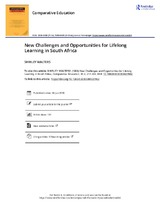New challenges and opportunities for lifelong learning in South Africa
Abstract
The imperatives for lifelong learning in South Africa are driven by its reinsertion into the global economy and by the social and political necessities of equity and redress after the years of colonialism, segregation and apartheid. It is therefore not surprising to find the discourse of lifelong learning infused into new policy documents. Utilizing Belanger's framework, which argues that lifelong learning is not a norm to prescribe but an empirical reality to analyze and reconstruct, the contexts for lifelong learning in South Africa are surveyed by focusing in on the state of initial education, adult education, and the learning environments. The framework, which acknowledges the daily lived realities of women and men, is a helpful way of retaining an holistic and integrated vision of lifelong learning and its humanistic, democratic goals. For lifelong learning in South Africa to deepen for more than a small group of well-educated, mainly urban, formally employed people, the author concludes that initial education, adult education and the learning environments of all the people will have to be improved. If this does not happen, then at least two polarized 'lifelong educations' will result.

